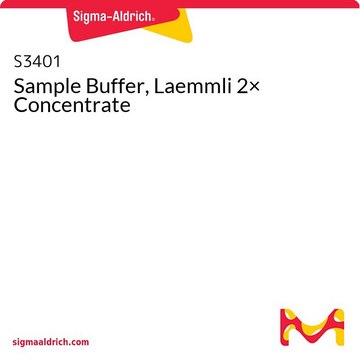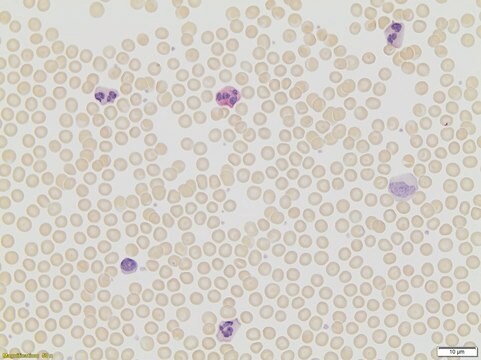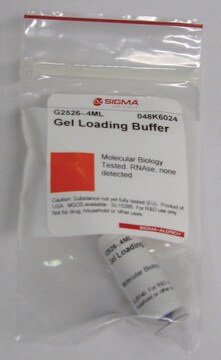Recommended Products
form
liquid
composition
bromophenol blue, 0.004%
DTT, 400 mM
glycerol, 20%
SDS, 4%
TRIS, 0.125 M
pH
~6.8
suitability
in accordance for electrophoresis test
storage temp.
−20°C
Application
Laemmli Lysis-buffer is an non-smelling lysis buffer used to prepare protein samples for SDS gel electrophoresis.
Signal Word
Danger
Hazard Statements
Precautionary Statements
Hazard Classifications
Acute Tox. 4 Oral - Eye Dam. 1 - Skin Irrit. 2
Storage Class Code
12 - Non Combustible Liquids
WGK
WGK 2
Flash Point(F)
Not applicable
Flash Point(C)
Not applicable
Personal Protective Equipment
dust mask type N95 (US), Eyeshields, Gloves
Choose from one of the most recent versions:
Already Own This Product?
Find documentation for the products that you have recently purchased in the Document Library.
Customers Also Viewed
Vincent Archambault et al.
Genes & development, 22(19), 2707-2720 (2008-10-04)
The conserved Polo kinase controls multiple events in mitosis and cytokinesis. Although Polo-like kinases are regulated by phosphorylation and proteolysis, control of subcellular localization plays a major role in coordinating their mitotic functions. This is achieved largely by the Polo-Box
Xiaoqiang Wu et al.
Analytical biochemistry, 421(1), 347-349 (2011-11-01)
A modified Laemmli sodium dodecyl sulfate-polyacrylamide gel electrophoresis (SDS-PAGE) protocol is described. The new method saves 30 min for gel casting without loss of the resolution power of Laemmli gel. In this method, both the upper and lower gels can
Sean R Gallagher
Current protocols in immunology, Chapter 8, Unit 8-Unit 8 (2008-04-25)
Electrophoresis is used to separate complex mixtures of proteins (e.g., from cells, subcellular fractions, column fractions, or immunoprecipitates), to investigate subunit compositions, and to verify homogeneity of protein samples. It can also serve to purify proteins for use in further
Sean R Gallagher
Current protocols in protein science, Chapter 10, Unit 10-Unit 10 (2012-04-04)
One-dimensional gel electrophoresis of proteins provides information about the molecular size, amount, and purity of a protein sample. Separated proteins can be recovered from polyacrylamide gels for subsequent characterization by a variety of secondary techniques, such as mass spectrometry to
K Zajda et al.
Human & experimental toxicology, 39(3), 276-289 (2019-11-09)
Tissue-dependent oestrogenic and anti-oestrogenic activity of polycyclic aromatic hydrocarbons (PAHs) has been suggested. In this study, the effect of two PAH mixtures, M1 composed of all 16 priority pollutants and M2 composed of five (noted in the highest levels) compounds
Our team of scientists has experience in all areas of research including Life Science, Material Science, Chemical Synthesis, Chromatography, Analytical and many others.
Contact Technical Service












